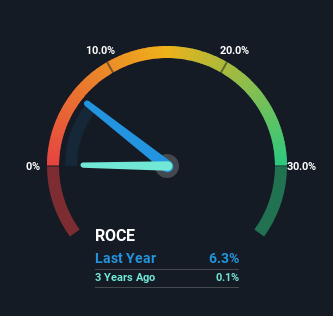Returns At Marriott Vacations Worldwide (NYSE:VAC) Are On The Way Up
Finding a business that has the potential to grow substantially is not easy, but it is possible if we look at a few key financial metrics. In a perfect world, we'd like to see a company investing more capital into its business and ideally the returns earned from that capital are also increasing. If you see this, it typically means it's a company with a great business model and plenty of profitable reinvestment opportunities. With that in mind, we've noticed some promising trends at Marriott Vacations Worldwide (NYSE:VAC) so let's look a bit deeper.
Understanding Return On Capital Employed (ROCE)
Just to clarify if you're unsure, ROCE is a metric for evaluating how much pre-tax income (in percentage terms) a company earns on the capital invested in its business. The formula for this calculation on Marriott Vacations Worldwide is:
Return on Capital Employed = Earnings Before Interest and Tax (EBIT) ÷ (Total Assets - Current Liabilities)
0.063 = US$568m ÷ (US$9.9b - US$896m) (Based on the trailing twelve months to March 2024).
So, Marriott Vacations Worldwide has an ROCE of 6.3%. Ultimately, that's a low return and it under-performs the Hospitality industry average of 10%.
Check out our latest analysis for Marriott Vacations Worldwide
In the above chart we have measured Marriott Vacations Worldwide's prior ROCE against its prior performance, but the future is arguably more important. If you'd like, you can check out the forecasts from the analysts covering Marriott Vacations Worldwide for free.
So How Is Marriott Vacations Worldwide's ROCE Trending?
Marriott Vacations Worldwide's ROCE growth is quite impressive. More specifically, while the company has kept capital employed relatively flat over the last five years, the ROCE has climbed 36% in that same time. So it's likely that the business is now reaping the full benefits of its past investments, since the capital employed hasn't changed considerably. On that front, things are looking good so it's worth exploring what management has said about growth plans going forward.
Our Take On Marriott Vacations Worldwide's ROCE
In summary, we're delighted to see that Marriott Vacations Worldwide has been able to increase efficiencies and earn higher rates of return on the same amount of capital. And given the stock has remained rather flat over the last five years, there might be an opportunity here if other metrics are strong. That being the case, research into the company's current valuation metrics and future prospects seems fitting.
One final note, you should learn about the 3 warning signs we've spotted with Marriott Vacations Worldwide (including 1 which is a bit unpleasant) .
While Marriott Vacations Worldwide may not currently earn the highest returns, we've compiled a list of companies that currently earn more than 25% return on equity. Check out this free list here.
Have feedback on this article? Concerned about the content? Get in touch with us directly. Alternatively, email editorial-team (at) simplywallst.com.
This article by Simply Wall St is general in nature. We provide commentary based on historical data and analyst forecasts only using an unbiased methodology and our articles are not intended to be financial advice. It does not constitute a recommendation to buy or sell any stock, and does not take account of your objectives, or your financial situation. We aim to bring you long-term focused analysis driven by fundamental data. Note that our analysis may not factor in the latest price-sensitive company announcements or qualitative material. Simply Wall St has no position in any stocks mentioned.
Have feedback on this article? Concerned about the content? Get in touch with us directly. Alternatively, email editorial-team@simplywallst.com

 Yahoo Finance
Yahoo Finance 
